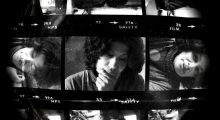Sundance
-
Sundance Film Festival 2019: Cold Case Hammarskjöld, Light From Light

I’m not at Sundance this year but, thanks to a generous smattering of pre-screenings, still playing along from home. Of the six titles I saw in advance, I was most curious about what kind of reception Mads Brügger’s Cold Case Hammarskjöld would receive. Based on his first two films, I’d pegged Brügger as a sort of more self-serious Sacha Baron Cohen; both blur the lines between journalist and satirist, parachuting themselves into definitely nerve-wracking, potentially dangerous situations under false pretenses in service of (at least aspirationally) a larger social agenda. Both Brügger’s The Red Chapel and The Ambassador placed the undisguisably Danish-accented, seemingly unflappable director/”star” in, respectively, North […]
-
“There’s a Lot of Hidden Pipework Pumping Out Information”: Director Stephen Merchant | Fighting with my Family

Whenever directors watch their own films, they always do so with the knowledge that there are moments that occurred during their production — whether that’s in the financing and development or shooting or post — that required incredible ingenuity, skill, planning or just plain luck, but whose difficulty is invisible to most spectators. These are the moments directors are often the most proud of, and that pride comes with the knowledge that no one on the outside could ever properly appreciate what went into them. So, we ask: “What hidden part of your film are you most privately proud of […]
-
“What’s So Bad About a Biopic?” Director and Producer Janice Engel | Raise Hell: The Life & Times of Molly Ivins

Whenever directors watch their own films, they always do so with the knowledge that there are moments that occurred during their production — whether that’s in the financing and development or shooting or post — that required incredible ingenuity, skill, planning or just plain luck, but whose difficulty is invisible to most spectators. These are the moments directors are often the most proud of, and that pride comes with the knowledge that no one on the outside could ever properly appreciate what went into them. So, we ask: “What hidden part of your film are you most privately proud of […]
-
“Documentary Felt Messier to Me, In a Good Way”: Director Liza Mandelup | Jawline

Whenever directors watch their own films, they always do so with the knowledge that there are moments that occurred during their production — whether that’s in the financing and development or shooting or post — that required incredible ingenuity, skill, planning or just plain luck, but whose difficulty is invisible to most spectators. These are the moments directors are often the most proud of, and that pride comes with the knowledge that no one on the outside could ever properly appreciate what went into them. So, we ask: “What hidden part of your film are you most privately proud of […]
-
“Living and Working with Each Other for Those Three Years in Almost Unbearable Life Conditions”: Directors Ljubo Stefanov and Tamara Kotevska | Honeyland

Whenever directors watch their own films, they always do so with the knowledge that there are moments that occurred during their production — whether that’s in the financing and development or shooting or post — that required incredible ingenuity, skill, planning or just plain luck, but whose difficulty is invisible to most spectators. These are the moments directors are often the most proud of, and that pride comes with the knowledge that no one on the outside could ever properly appreciate what went into them. So, we ask: “What hidden part of your film are you most privately proud of […]
-
“Whenever You Build a World You Open Yourself Up to It”: Director Sophie Hyde | Animals

Whenever directors watch their own films, they always do so with the knowledge that there are moments that occurred during their production — whether that’s in the financing and development or shooting or post — that required incredible ingenuity, skill, planning or just plain luck, but whose difficulty is invisible to most spectators. These are the moments directors are often the most proud of, and that pride comes with the knowledge that no one on the outside could ever properly appreciate what went into them. So, we ask: “What hidden part of your film are you most privately proud of […]
-
“I Had to Grow Up”: Director Hepi Mita | MERATA: How Mum Decolonized the Screen

Whenever directors watch their own films, they always do so with the knowledge that there are moments that occurred during their production — whether that’s in the financing and development or shooting or post — that required incredible ingenuity, skill, planning or just plain luck, but whose difficulty is invisible to most spectators. These are the moments directors are often the most proud of, and that pride comes with the knowledge that no one on the outside could ever properly appreciate what went into them. So, we ask: “What hidden part of your film are you most privately proud of […]
-
“I Lost My DP To a Fancier Job”: Director Hannah Pearl Utt | Before You Know it

Whenever directors watch their own films, they always do so with the knowledge that there are moments that occurred during their production — whether that’s in the financing and development or shooting or post — that required incredible ingenuity, skill, planning or just plain luck, but whose difficulty is invisible to most spectators. These are the moments directors are often the most proud of, and that pride comes with the knowledge that no one on the outside could ever properly appreciate what went into them. So, we ask: “What hidden part of your film are you most privately proud of […]
-
“We as People Have Agency to Change Things”: Director Jacob Aaron Estes | Relive

Whenever directors watch their own films, they always do so with the knowledge that there are moments that occurred during their production — whether that’s in the financing and development or shooting or post — that required incredible ingenuity, skill, planning or just plain luck, but whose difficulty is invisible to most spectators. These are the moments directors are often the most proud of, and that pride comes with the knowledge that no one on the outside could ever properly appreciate what went into them. So, we ask: “What hidden part of your film are you most privately proud of […]
-
“We Did as Many Long Takes as Possible”: Director Julius Onah | Luce

Whenever directors watch their own films, they always do so with the knowledge that there are moments that occurred during their production — whether that’s in the financing and development or shooting or post — that required incredible ingenuity, skill, planning or just plain luck, but whose difficulty is invisible to most spectators. These are the moments directors are often the most proud of, and that pride comes with the knowledge that no one on the outside could ever properly appreciate what went into them. So, we ask: “What hidden part of your film are you most privately proud of […]










